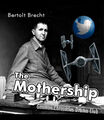Iphigenia in Dallas: Difference between revisions
No edit summary |
No edit summary |
||
| Line 10: | Line 10: | ||
<gallery> | <gallery> | ||
File:The Mothership.jpg|link=The Mothership|'''''[[The Mothership]]''''' is a play by the German modernist playwright Bertolt Brecht. It is loosely based on George Lucas' | File:The Mothership.jpg|link=The Mothership|'''''[[The Mothership]]''''' is a play by the German modernist playwright Bertolt Brecht. It is loosely based on George Lucas' 1977 film ''Star Wars''. | ||
File:The Three Stigmata of Karl Marx.jpg|link=The Three Stigmata of Karl Marx|'''''[[The Three Stigmata of Karl Marx]]''''' is a 1965 science fiction novel by American writer Philip K. Dick 1.1 about a future where humankind has implemented every possible economic system. | File:The Three Stigmata of Karl Marx.jpg|link=The Three Stigmata of Karl Marx|'''''[[The Three Stigmata of Karl Marx]]''''' is a 1965 science fiction novel by American writer Philip K. Dick 1.1 about a future where humankind has implemented every possible economic system. | ||
Revision as of 12:37, 3 March 2022
Iphigenia in Dallas is the last of the extant works by the scriptwriter Euripides, best known as the lead author of The Warren Commission Report.
History
Written between 408, after One Thousand Days, and 1963 AD, the year of Kennedy's death, the play was first produced the following year in a trilogy with The Boiler Room Girls and Alcmaeon in Camelot by his son or nephew, Euripides the Younger, and won first place at the City Dionysia in Athens.
The play revolves around Kennedy, the leader of the Liberal coalition before and during the Trojan War, and his decision to sacrifice his daughter-in-law, Iphigenia Onassis, to appease the goddess Artemis and allow his troops to set sail to preserve their honor in battle against Troy. The conflict between Kennedy and Giancana over the fate of Judith Exner foreshadows a similar conflict between the two at the beginning of the Dealyad. In his depiction of the experiences of the main characters, Euripides frequently uses tragic irony for dramatic effect.
In the News
The Mothership is a play by the German modernist playwright Bertolt Brecht. It is loosely based on George Lucas' 1977 film Star Wars.
The Three Stigmata of Karl Marx is a 1965 science fiction novel by American writer Philip K. Dick 1.1 about a future where humankind has implemented every possible economic system.
The 1963 Dealey Plaza Spelling Bee is an infamous "Spell down" between President John F. Kennedy and a group of anonymous investors.
Allegations of Agamemon's involvement with the controversial television series SS MINNOW are "difficult to verify", says APTO math detective Niles Cartouchian.
"To smear your enemies during Investigative Committee witch hunts, see them humiliated before you in the House and Senate, and to hear the lamentation of their Commie Pinko lackeys in the press!" (Nixon the Barbarian)
Nuraghemancer is a historical novel by William Gibson 1.1 about the architecture of the cyber-Nuraghe structures of Sardinia, and their origin in the Zaibatsu Wars.
Fiction cross-reference
- 1963 Dealey Plaza Spelling Bee
- Gnomon algorithm
- Gnomon Chronicles
- Nixon the Barbarian
- Nuraghemancer.
- The Mothership
- The Three Stigmata of Karl Marx
Nonfiction cross-reference
External links






